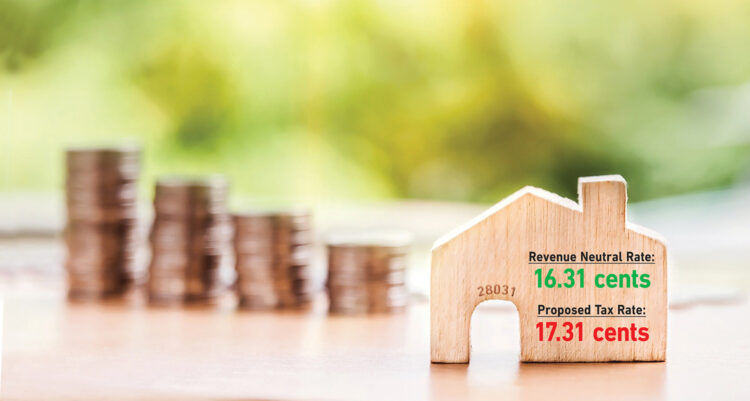 June 5. By Dave Yochum. Our new property tax bills, based on rising property valuations and proposed tax rates that are above revenue neutral, will, generally speaking rise about 11.9 percent, with 9.3 percent attributable to Mecklenburg County and 2.6 percent attributable to the Town of Cornelius.
June 5. By Dave Yochum. Our new property tax bills, based on rising property valuations and proposed tax rates that are above revenue neutral, will, generally speaking rise about 11.9 percent, with 9.3 percent attributable to Mecklenburg County and 2.6 percent attributable to the Town of Cornelius.
Nearly three-quarters – 73 percent – of a total property tax bill in Cornelius is due to the county, while the remainder 2.6 percent funds town services like public safety, parks and public works.
Since the last revaluation in 2019, we’ve used $400,000 as a representative property value here in Cornelius. We’re going to stick with that amount for a moment.
Given appreciation since then, 47 percent as per the Mecklenburg County Tax Assessor, that $400,000 home in Cornelius could be assessed at $588,000 – the amount on which we did the following calculations. ($588,000 isn’t off base at all. According to the Mecklenburg Assessor’s Office, the median valuer of a home in Cornelius is $457,500 and the average is $686,963.)
Cornelius
If Town Manager Andrew Grant’s proposed $31.796 million budget – or something very close to it – is approved by the Town Board, the town’s tax rate would be 17.31 cents. (Revenue neutral would be 16.31 cents.)

Andrew Grant
Impact-wise, one penny in addition to the revenue neutral rate generates about $1 million in additional revenue to the town.
The current rate, 23.2 cents, is based on lower valuations, i.e. the $400,000 pre-revaluation, which produced $928 in tax revenue annually for the town.
The proposed rate, at 17.31 cents, would result in Cornelius-only taxes of $1,018 on the $588,000 house – which used to be $400,000.
Mecklenburg
Meanwhile, County Manager Dena Diorio has recommended a county-only tax rate of 47.31 cents per $100 of assessed valuation. (Following the 2023 property revaluation, the revenue neutral tax rate is 45.71 cents.)
County taxes comprise about two-thirds of your total property tax bill in Cornelius.
Let’s go back to the pre-reval $400,000 house. To calculate your old county taxes (or town taxes), take the value of your property, divide by 100 and multiply by 0.6169. For example, the owner of that $400,000 house had an annual County tax bill of $2,467.60
The owners of the $588,000 house would pay $2,781.82 a year in property taxes to Mecklenburg County.
In toto
Combined town and county property taxes on the $588,000 house would be $3,799 per year.
The owner of the $400,000 house, under the old rate – combined 84.89 cents – was paying $3,395 per year in property taxes.
These taxes will be due on Sept. 1, and interest will be added for unpaid balances starting in January, 2024.
So the owners of the $400,000 house/now $588,000 house are looking at an 11.9 percent increase in property taxes.
What happens next?
The Mecklenburg County Board will hold straw vote sessions on June 1. The board is expected to adopt the Fiscal Year 2024 budget at its regular meeting on June 6.
Manager Grant’s proposed budget is expected to be voted on at tonight’s Town Board meeting. Sources say it will pass 4-0 with one commissioner absent due to travel. A new budget must be adopted in time for the new fiscal year on July 1.
Revenue neutral is a post-reval benchmark
The Revenue-neutral neutral rate provides provides taxpayers a bench- mark against which to compare a proposed post-revaluation tax rate.
North Carolina requires taxing units – counties and municipalities like Cornelius – to publish a revenue-neutral property tax rate as part of its budget for the fiscal year following a revaluation.
Town Manager Andrew Grant’s proposed tax rate for the fiscal year starting July 1 would be 17.31 cents, while revenue neutral would be 16.31 cents.
According to the NC School of Government, revenue-neutral is calculated as follows:
1. Determine a rate that would produce revenues equal to those produced for the current fiscal year.
2. Increase the rate by a growth factor equal to the average annual percentage increase in the tax base due to improvements since the last general revaluation.
3. Adjust the rate to account for any annexation, de-annexation, merger, or similar event.
Approvals for new construction projects don’t necessarily make for a lower tax rate, according to Town Commissioner Colin Furcht.
“Since the 30 plus projects that were approved over the years have not started, thus not providing full tax revenue and most folks agreeing to our ‘Time Out’ on residential and commercial building, the only way to pay for these services is taxes. Until these projects come out of the ground, this really is the only option. I understand that raising taxes is not a popular opinion but remember, we still have the lowest tax rate in the region,” Furcht said.




